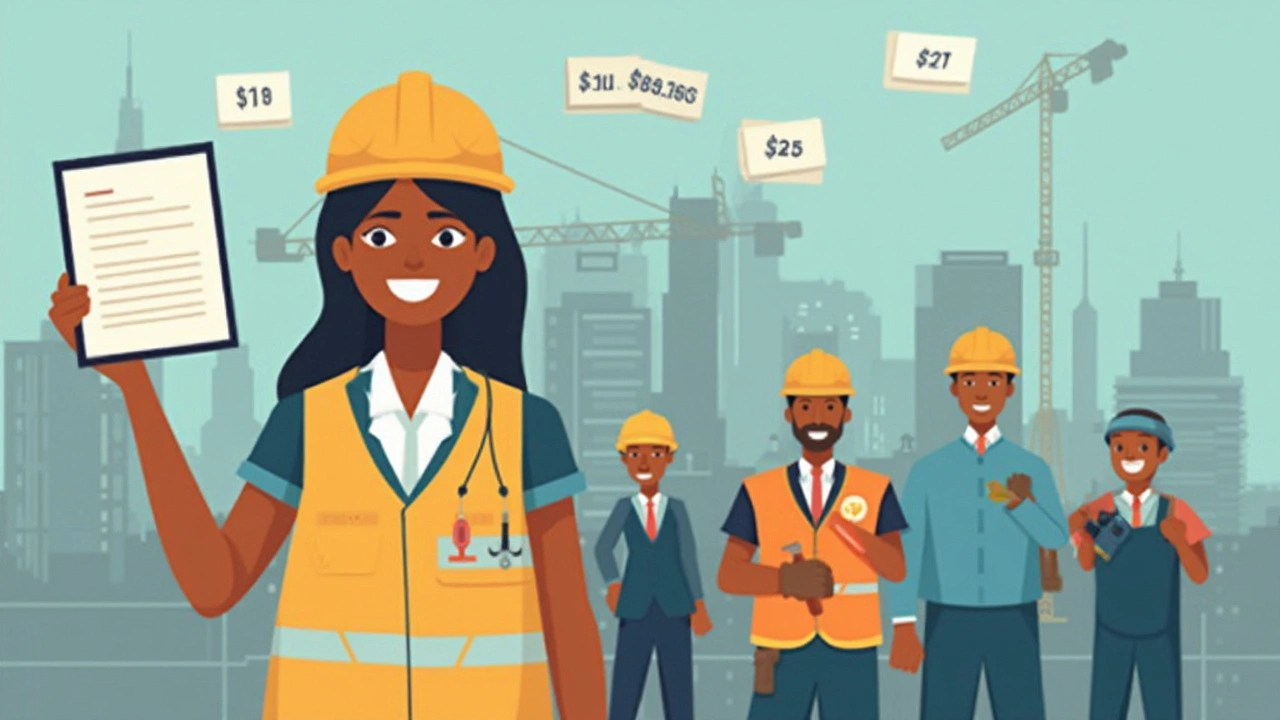You see those cranes swinging above city skylines and probably wonder—who in all those hard hats pulls in the biggest check? Construction is a muscle-and-brain kind of field, and not all jobs pay the same. If you’re just starting out, or even if you’ve been in boots for years, knowing which roles are the real money-makers can change everything about your career.
The highest paid construction jobs aren’t always the ones you expect. Elevator installers, pile driver operators, and crane operators often outrank others when it comes to hourly wages. Some of these folks make over $100,000 a year, and that’s not counting overtime. Compare that to a general laborer who might start at under $20 an hour in many places—the gap’s pretty wild.
But hey, chasing the top dollar isn’t just about picking up a hammer and hoping for the best. It’s about working smarter, getting the right certifications, and sometimes specializing so much that only a handful of people can do what you do. Stick around, and you’ll see exactly which gigs pay top dollar, why they do, and how you can crack that club.
- Construction Salaries: The Hard Numbers
- Why Some Construction Jobs Pay More
- Top Paying Trades—Who’s Really on Top?
- How to Boost Your Earnings in Construction
- Certifications and Skills That Matter
- Is Chasing the Money Worth It?
Construction Salaries: The Hard Numbers
If you’re curious about paychecks in the construction world, get ready for some eye-openers. Wages can swing a lot depending on your title, skills, and where you work. Let’s break it down with some real numbers. According to the U.S. Bureau of Labor Statistics, the average hourly wage for all construction workers is around $28, which lands you just under $60,000 a year if you’re working full-time and grabbing some overtime.
But here's where it gets interesting—specialized roles blow past that average. Take elevator installers and repairers. These folks top the charts, often making $45 to $60 per hour, and yearly pay can cross $120,000 if they catch extra shifts. Pile driver operators, especially those working big infrastructure projects, regularly hit $35 to $55 an hour. That can rack up to $90k to $110k a year, easy.
Cranes? Those giant machines aren’t just for show. Skilled crane operators can pull in $80,000 to $100,000 a year. Electricians and plumbers—if they’re certified and have years under the belt—can see $70,000 to $90,000, sometimes more if they’re in high-cost cities.
And here’s a quick ranking of some of the highest paid construction worker gigs by average yearly salary in 2024:
- Elevator Installer & Repairer: $120,000+
- Cranes & Tower Operator: $80,000-$100,000
- Pile Driver Operator: $90,000-$110,000
- Master Electrician: $80,000-$100,000
- Plumber/Pipefitter: $75,000-$95,000
Entry-level or general labor? Those jobs usually pay between $35,000 and $45,000 per year, but some places still start closer to minimum wage. So, the gap between skilled trades and the rest isn’t small.
Big city? You’ll usually earn more, but cost of living can eat up the boost. Out in the country, pay can dip, but so do your bills. Always check the numbers for your area before making big moves.
Why Some Construction Jobs Pay More
Not all construction gigs pay the same, and it’s not just luck. Certain jobs come with bigger paychecks because the skills are rare, the work is risky, or the job needs special training. If you’ve ever wondered why an elevator installer or a crane operator pulls in way more than a painter, here’s what’s up.
First off, some trades are straight up dangerous. Being hundreds of feet in the air or handling heavy machinery isn’t for everyone. The higher the risk, the more companies are willing to pay to get the job done safely. Plus, nobody wants to climb inside cramped elevator shafts every day except the folks who really know what they’re doing.
Specialized know-how is another big reason for higher pay. It takes years—and sometimes a ton of schooling or apprenticeships—to run a giant crane or install complicated electrical systems in high-rises. Uncommon skills mean there’s less competition, so you can command a higher salary.
The market matters too. If a city is booming and a certain skill is in high demand, you can bet the price goes up. For example, data from the U.S. Bureau of Labor Statistics shows elevator installers and repairers often take home over $97,000 a year on average, and some make even more with overtime and bonuses.
"Wages climb not just with experience, but when you can do the work few others can handle—and can do it safely and on time," says Jason Jones, president of a national contractor group.
Looking for the numbers? Check out this quick breakdown:
| Trade | Average Annual Pay (2024) | What Makes It Pay More |
|---|---|---|
| Elevator Installer | $98,000 | Specialized, high-risk, low supply |
| Crane Operator | $74,000 | Special training, heavy responsibility |
| Electrician | $63,000 | Technical skills, licensing |
| General Laborer | $39,000 | Entry level, lots of supply |
If you want to shoot for the highest paid construction worker spot, go where the skills are rare and the risk is up. Or chase the certifications that nobody else around has—it’s all supply and demand.
Top Paying Trades—Who’s Really on Top?
If you want to know who’s really making bank in construction, the numbers tell a story you can’t ignore. Sure, CEOs and managers in big construction companies rake it in, but let’s talk about boots-on-the-ground folks actually doing the work.
The highest paid construction worker jobs usually fit into a small group of specialized trades. These gigs aren’t for everyone—they take real skill, sometimes nerves of steel, and often more training (and certs) than the average position. Here’s a breakdown of median annual earnings for 2024, according to data from the U.S. Bureau of Labor Statistics (BLS) and Glassdoor:
| Trade | Median Annual Pay |
|---|---|
| Elevator & Escalator Installers | $101,000 |
| Crane & Tower Operators | $73,000 |
| Pile Driver Operators | $74,000 |
| Electricians | $62,000 |
| Plumbers & Steamfitters | $61,000 |
Elevator installers always seem to run at the top—why? For starters, installing and maintaining elevators isn’t just about brute strength. They work in super-tight spaces, deal with high-voltage stuff, and any mistake could be fatal. Not everyone’s up for that, so they can charge premium rates.
Crane operators also make decent money because there’s a lot on the line every time they sit in that cab. One wrong move, and you’ve got a disaster. These workers need special certifications and have to stay sharp all day long.
Pile drivers sound old school, but these folks do the foundation work for massive buildings and bridges. It’s risky, it’s loud, and scheduling is unpredictable, so companies pay extra for experience.
You’ll see electricians and plumbers up there too. Good ones are always in demand, and with a few years of experience (and maybe a master license), these jobs can pull in six figures—especially on major commercial or industrial gigs.
- If you’re eyeing bigger pay, get curious about those specialized trades.
- Look at what training or apprenticeship you’ll need—it’s usually worth it.
- Don’t forget: unions in these trades help push hourly rates higher and keep conditions safer.
So, if money’s your main motivator, don’t aim for "any construction job." Go for the specialties everyone else avoids. That’s where the big checks live.

How to Boost Your Earnings in Construction
If you’re set on taking home more than the average construction check, you really need to play your cards right. Climbing the pay ladder in construction isn’t just about showing up and working hard—you’ve got to make smart moves, specialize, and sometimes even switch roles when the timing’s right.
The most obvious step: skill up. Workers with advanced training or certifications land the jobs with bigger paychecks. For example, a certified crane operator can make double what a regular laborer does, according to the latest Bureau of Labor Statistics numbers. And if you’re thinking of taking a course, union apprenticeship programs in many skilled trades (like electrical or HVAC) don’t just train you—they pay you while you learn.
- highest paid construction worker jobs often require a combination of technical know-how and safety certifications. Pile driver operators, for instance, can pull $70,000 to $110,000 a year, but you’ll need a commercial driver’s license and some serious hands-on experience.
- Supervisory roles pay more, but you usually need time in the field first. General contractors, project managers, and site superintendents can bring in $90,000 or more, especially if they’re running bigger commercial sites.
- Some specialized trades like elevator installer or boilermaker can reach over $100,000, especially with overtime or jobs in big cities. Getting into these trades typically means joining an apprenticeship and earning certifications like OSHA-30 or a state license.
- Location affects your paycheck. Construction pros in places like California or New York generally make 20-30% more than those in the South, even for the same job title. Working in remote locations, like Alaskan oil sites, also pays more but comes with lifestyle tradeoffs.
Check out these typical salaries for skilled trades from 2024 BLS data:
| Job Title | Average Salary |
|---|---|
| Elevator Installer | $101,000 |
| Crane Operator | $83,000 |
| Electrician | $61,000 |
| HVAC Technician | $57,000 |
| General Laborer | $41,000 |
Want to boost your income this year? Put in for overtime, grab every safety or equipment certification offered, and keep checking job boards in higher-paying regions or specialties. If you’re willing to travel or relocate, your paycheck can jump pretty fast. And don’t sleep on networking—sometimes the best jobs come from a buddy who knows someone hiring for a big gig.
Certifications and Skills That Matter
The truth is, most of the highest paid construction workers don’t land those paychecks by accident. They’ve got a bunch of certifications tucked in their toolbelt, and some serious skills that make bosses take notice. Getting certified isn’t just “nice to have”—for a lot of high-paying jobs, it’s the only way in.
Let’s talk specifics. If you want to work as an elevator installer or repairer (yup, one of the highest paid construction worker jobs out there), you’ll need to go through a four-year apprenticeship. When you’re done, you take a licensing exam. Crane operator? You’ll need a certification from the National Commission for the Certification of Crane Operators (NCCCO) in most of the U.S. It’s the law in a lot of states. Electricians almost everywhere have to pass state or local licensing tests, and many trades have OSHA 10 or OSHA 30-hour safety cards as a bare minimum.
Here’s a quick snapshot of must-have certifications and skills for top-earning roles:
- Crane Operator: NCCCO certification, hours logged operating specific crane types.
- Elevator Installer: 4-year apprenticeship, state licensing exam, union membership helps a ton.
- Electrician: State license, apprenticeship, advanced courses in new tech (like solar).
- Pile Driver Operator: Apprenticeship, sometimes commercial driver’s license (CDL).
- Project Manager: PMP (Project Management Professional) certification can boost salary by $10,000 or more a year.
Specialty skills make a real difference, too. Think welding, blueprint reading, digital plan software (and yes, even drone operation). If you know how to use advanced tech in the field, you stand out fast.
| Job | Certification Needed | Average US Salary |
|---|---|---|
| Elevator Installer | State License, Apprenticeship | $99,000 |
| Crane Operator | NCCCO, Apprenticeship | $76,000 |
| Electrician | State License, Apprenticeship | $61,000 |
| Pile Driver Operator | Apprenticeship, CDL (sometimes) | $70,000 |
| Project Manager | PMP (optional, but helps) | $97,000 |
One tip—stay updated. Safety rules and tech change every year. Even seasoned construction pros need fresh certs to stay on top. If you’ve got your eye on a bigger paycheck, invest the time in skill upgrades and show you can handle the toughest jobs on site.
Is Chasing the Money Worth It?
When you hear about elevator installers making six figures or tower crane operators racking up big money, it’s tempting to chase those roles. But there’s a real question buried in all that: is showing up just for the cash actually worth it?
Let’s be honest, the highest paid construction worker jobs often trade big bucks for big responsibilities, longer hours, or steeper risks. Here’s what you need to weigh before jumping for the fattest paycheck:
- Sacrifice of Time: Overtime isn’t just a nice bonus—sometimes it comes with weekend, night, or holiday shifts. Elevator mechanics frequently spend 60+ hours a week on the jobsite, especially in large cities where downtime is pricey.
- Physical and Mental Toll: Working at heights, dealing with heavy machinery, or taking on big projects can wear you down. Crane operators, for example, need steady nerves and laser focus because one slip is a huge deal—not every personality fits here.
- Certification and Upkeep: The higher the paycheck, the more hoops you have to jump through. Specialized licenses, years of apprenticeship, and regular safety training are a must. Lose a required card and you’re benched until you fix it.
- Job Site Risk: Pay climbs with danger. Pile driver operators and steelworkers see higher accident rates. Insurance helps, but the stress is real.
The table below shows average pay and typical hours for these big-earning gigs:
| Role | Average Annual Pay (2024) | Typical Weekly Hours |
|---|---|---|
| Elevator Installer | $105,000 | 55-60 |
| Crane Operator | $95,000 | 50-60 |
| Pile Driver Operator | $80,000 | 50+ |
| General Laborer | $42,000 | 40-45 |
Notice how the big earners aren’t working cushy schedules. It helps if you love the challenge, adrenaline, or pride that comes from pulling off intense jobs. Chasing highest paid construction worker status just for the money can burn you out fast if you’re not into the work itself.
The best tip? Spend a day shadowing someone already in that high-paying role before you invest years moving up. See if the pace, pressure, and process fit what you want from work and life. Some folks love the grind and the rewards; others end up happier in lower-key gigs that let them see their families during the week. Only you know what makes the grind worth it.


Write a comment